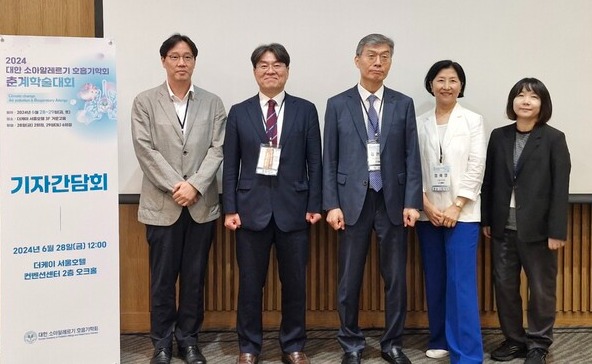In this country with people raising 15 million dogs and cats, many people suffer from allergic diseases related to their pets. Still, only a quarter or a third of them visit hospitals, according to a study.
The Korean Academy of Pediatric Allergy and Respiratory Disease (KAPARD) held its spring conference on “Air Pollution and Pediatric Allergic Respiratory Diseases" at The K Hotel Seoul last Friday and Saturday.
"Pets have recently become an important issue in our daily lives. However, many people who have allergic diseases do not even know it is a disease," said KAPARD Chair Kim Hyun-hee, who is also a professor of pediatrics at the Catholic University of Korea Uijeongbu St. Mary’s Hospital. "It is important to seek medical diagnosis and treatment early," she said.
According to a study by Professor Lee Sang-min of Dankook University College of Medicine introduced by Professor Sol In-suk of the Department of Pediatrics at Yonsei University College of Medicine, many people suffer from allergic diseases while owning dogs and cats but only one-quarter to one-third of them visit a hospital even if they experience allergy symptoms.
"In the era of 15 million pets, dogs and cats are more than pets and they are becoming family members," said Yeom Hye-young, public relations director of KAPARD and a professor of pediatrics at Seoul Medical Center. "It is best to avoid them, but if you can't, you can consider immunotherapy. If you have to be exposed, you can take preventive medications in advance."

At the conference, participants also pointed out that environmental pollution hugely impacts human health, especially children and adolescents, and that active measures should be taken.
"Rapid climate change, which is too hot, cold, and windy, also has many effects on air quality," Professor Sol said while introducing the Korea Disease Control and Prevention Agency’s “National Policy to Respond to Climate Change and Chronic Respiratory Allergic Diseases in Children. "As a result, there is a lot of fine dust, and these airborne substances harm respiratory health."
"Warmer weather and longer tropical nights will also lead to higher levels of carbon dioxide, which will increase the number of allergenic foods and affect children and adolescents vulnerable to allergies," she added.
Sol also noted that the increase in air pollutants outside is bound to affect indoor air quality.
In the overseas invitation lecture, in-depth lectures and discussions on air pollution and pediatric respiratory health were also made.

Some experts pointed out that the deteriorating environment due to climate change is threatening the health of children and adolescents by causing respiratory and allergic diseases. Still, there are fewer specialists to treat them, and it is urgent to prepare countermeasures.
"Currently, essential medicine is struggling to the point of collapse due to problems over the years," KAPARD Chair Kim said. "It is a serious situation, and our academy will continue to make academic advances to improve the health of children and adolescents, who are the future of Korea."
However, he expressed frustration that there are no applicants for subspecialists who deal with pediatric respiratory and allergic diseases.
"The problem of fewer applicants for allergist-respiratory specialists cannot be solved by our academy alone. The problems that we have ignored are now becoming a reality.” Kim said. "Low medical fees and problems facing essential care physicians need to be addressed, for example. I hope a consensus will be reached to address these issues."
Kim added that the group, although not large in scale, will not retreat but lead the way academically.
"KAPARD will continue to do its best to fulfill its mission of advancing care, education, and research, even with a small number of people, under difficult conditions," he said.
Related articles
- A decade of progress: pneumococcal vaccination vital in protecting Korean children
- Regulator warns against purchasing health supplements from overseas
- GSK’s 3-drug combo asthma drug Trelegy Ellipta gets insurance benefit
- 'Vitamin D during pregnancy found to protect against fine dust–related kidney damage'

